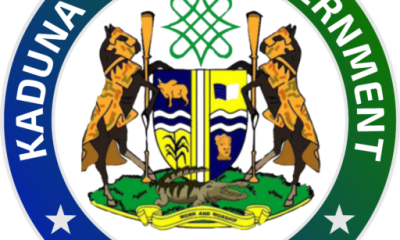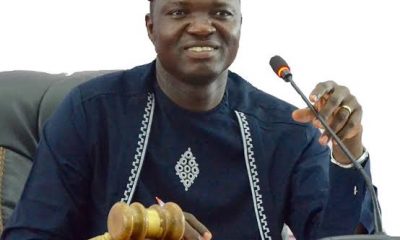EDITORIAL
Need to Accelerate Payment of Pensions

Over the years, retirees and pensioners in Nigeria have faced endless travails over non prompt payment of gratuities and pensions. In the process, many elder statesmen who have diligently served this nation have died without receiving their benefits, leaving their children and relatives in pain and penury.
The question agitating the minds of retirees and pensioners is why the beneficiaries of the pension can’t be paid promptly on retirement without making them go through agonizing pains that they sometimes have to offer bribes to fast-track the process. It is unfortunate that receiving one’s benefit after retirement has become a nightmare.It is even more concerning that the category of individuals in question are very senior citizens who have sacrificed the best part of their lives serving the nation. Retirement should not be a death sentence; it should be a period workers would happily look forward to with joy, hope and pleasure.In compliance with the Pension Reform Act (PRA) of 2004, the Pension Transitional Arrangement Directorate (PTAD) was established in August 2013. PRA also gave rise to the National Pension Commission (PenCom) to regulate, supervise and ensure the effective administration of pension matters in the country. PRA was repealed and re-enacted in 2014.With the this Act, PTAD took over the management of the pension offices of the civil service, police, customs, immigration, prisons and over 200 treasury funded parastatals. Despite the good intentions of the architects of the pension reforms, unnecessary delays in pension and gratuity payment to pensioners as well as alleged shady deals have characterized the National Pension Commission, thereby defeating the purpose of effective and efficient administration for which it was established.Following the outcry of beneficiaries over endless delays in the payments of persons and gratuities, the commission recently introduced an e-clearance platform to its website. The platform according to the commission, is to supply as well as expedite pension clearance certificate (PCC), for pensioners.In addition, pensioners can now do their submissions for verification from the convenience of their homes facilitating, real time tracking update, reduced paper work, enhanced security, data protection for enhanced user friendly interface.However, it is not yet Uhuru for the senior citizens even as the commission likened what it called a positive development to douse the criticism that has bedeviled the process in recent times as speculations were rife that the federal government intended to borrow from the fund for infrastructure development. This rumor was perceived as absurd and sad going by the apparent hardship pensioners are going through occasioned by the delays in payment of their monthly pensions.Again, the removal of fuel subsidy has compounded the suffering of pensioners. It has elevated their plight into more economic hardship, with the pension fund lying apparently inaccessible by pensioners and prompting the federal government to contemplate the idea of taking a loan from the pension fund for capital project development. This move should be well considered before a final decision is takenThe agonizing hardship due to the economic downturn in Nigeria has inflicted terrible pains as most pensioners and retirees are suffering in silence, yet those who are saddled with the responsibility to manage the funds are mercilessly embezzling, misappropriating or pilfering the funds. The two billion naira Maina-gate readily comes to mind. Could both NPC and PFAs be the barrier to a repeal of obnoxious Pension Act; that has enslaved workers and retirees to the undue advantage of government officials at the helm of pension fund as well as their Pension Administrators who are said to be using PFAs as fronts for politicians in collaboration. That is why it is believed that the same politicians in the legislative chambers will never support bills to abrogate laws like the pension Act and give it a human face.Simply put, man should not be made for the law but the law should be made for man. Pension Act advocates have expressed reservations and concern in both mainstream media and social media on the plight of pensioners and retirees. Some have opined that both civil servants and retirees should be allowed to withdraw all their savings and invest in their endeavor of interest.According to these pensioners and retirees advocates, the Pencom/PFA Scheme is an unsavory exploitation of workers and poor retirees as on retirement at 60 years, a retiree can only through thick and thin access 25% of his or her fund, with the balance being spread over 15years on monthly payments. In other words the retiree is expected to die at 75 years.It is the belief of concerted Nigerians that most pensioners and retirees will do better in business for themselves and get better Return On Investment (ROI), if they have direct access to their pension benefits. And that is why the amendment of the Pension or total abrogation will enhance retirees’ purchasing power and boost the economy in the process.Pension Act amendment protagonists have suggested that civil servants should be allowed to access their funds immediately after retirement. The amendment of the Pension Act in this regard will go along way serving as a palliative to civil servants as well as allow them to plan and invest for a better life after retirement. The simple illustration below depicts the exploitation of pensioners and retirees. A civil servant retires at 60 and gets an entitlement of N10m and decides to invest N7m in money market or government treasury bills at the usual 15% PA, his or her monthly interest will be N87,500 while PFAs pay N19,500 on the same amount monthly. This is exploitative. From the above illustration, the pensioner or retiree is losing over 55% of what he should have earned from money market or Government Treasuring bills.A recent survey in UK has it that pensioners are not at ease with the government and pension administrators as the survey states that around a 3rd (32%) could afford to contribute more to their pensions now in order to boost their retirement income. But while savers are seeing the value of pensions, the survey discovered that there remains a fundamental misunderstanding by savers about their pensions with many individuals unsure of how their contributions were being invested on their behalf.As at the period of the survey, the UK Prime Minister was forced to announce an emergency £350 of support per household to help with the cost of heating. As a result, almost half (47%) of those not retired say that they cannot afford to save right now due to the rising cost of everyday living. Relatively, the above action can be said to be usage of Pension Fund to improve the standard of living for UK civil servants.In this era of excruciating economic agony, a presidential executive bill to unbundle the pension Act of 2014 has become necessary as it would go along way in serving as succor to civil servants and pensioners. This bill can also serve as an auxiliary to the pending move by the senate to amend the Pension Act to enable Nigerians withdraw up to 75% of their total cumulative pension savings; this will also help douse the negative believe that PFAs are grossly manipulating and exploiting Nigerian workers.Also, production will be overwhelmingly stirred up, should this critical stance on abrogating the Pension Act be acted upon.DAILY ASSET insists that there is a compelling need to address the plight of retired senior citizens in the country, with the Pension Asset Fund currently standing at 21.14 trillion naira as of the end of August 2024.EDITORIAL
Ground Rent: Thumbs Up For FCT’s Bold Move Against Defaulters

In September 2023, the Minister of Federal Capital Territory, Nyesom Wike rattled Abuja land racketeers with an ultimatum asking them to develop plots of land alloted to them within two years or risk revocation. Most of those plots were in prime spots in the city centre and were alloted for not less than 20 years without any development.
Some plots were overgrown into forests with tall trees, becoming havens for undesirable elements. Ab initio, majority of those who acquired such lands had no plans for any development other than leaving them fallow for future profiteering and racketeering. The processes of acquiring complete title documents for those lands and annual payments of ground rent were observed in breach.The payment of ground rent is a legal requirement under the Land Use Act of 1978.The Act empowers the Governor of a state or the President, in the case of the Federal Capital Territory (FCT), to demand rental for any land granted to any person.The Consequences of non-payment or failure to pay ground rent can result in the imposition of penal rent, revision of penal rent, or outright revocation of the Certificate of Statutory Right of Occupancy.Wike, invoking relevant laws had continued to issue ultimatum with clear time lines to the allottees of undeveloped and fully developed plots of land on case by case basis from time to time to either develop such lands or pay up their ground rent indebtedness (up to date) to the FCT administration or risk revocation. Some allottees failed to heed those warnings.Another ultimatum was again issued three months ago, asking those yet to comply with earlier ones to pay up their indebtedness. Again, the warning went unheeded.Consequently, officials of the FCT administration on May 26, 2025, forcefully enforced the ultimatum by sealing properties of defaulters.High profile defaulters, amongst them; the People’s Democratic Party (PDP), Federal Inland Revenue Service (FIRS), Access Bank, et al, had their properties sealed.In a country, where corrupt proceeds are channeled into building of huge houses and sprawling estates, the FCT administration has taken the right steps to enforce the law on payment of ground rent.The sealing of such properties, preparatory to revoking their title documents is a signal to those corrupt individuals and corporate bodies that nobody – individual or corporate – is above the law.After all, the rent being charged on those properties are far in excess of the rightful rent tenants ought to pay.DAILY ASSET hereby commends Minister Nyesom Wike and his team for courageously invoking the law and applying appropriate sanctions against defaulters, no matter their status. This step has erased erroneous belief that some persons and corporate bodies are above the law.In the spirit of accountability, we ask the FCT administration to account for all proceeds and utilisation of the ground rent and other land fees collected.While applauding the FCT administration for the bold move, we caution against excessive or indiscriminate use of force in dealing with defaulters. Instead, dialogue and persuasion should be deployed for the good image of individuals and corporate bodies with their landlord the FCT.Most importantly, we urge the FCT to step out clean and clear the controversy from some corporate bodies, like the FIRS, PDP and a few individuals, insisting they are up to date in all land fee payments. And if their claims are found to be true, the FCT administration should be courageous enough to apologize to them to avoid the backlash of negative perception from the public against such bodies and individuals. Anything short of this might be judged as selective vindictiveness.EDITORIAL
Need to Urgently Redeem the Image of Nigeria’s Judiciary

The symbol of a blindfolded lady with a scale in one hand and a knife in the other depicts the balance and fairness the judiciary should represent in the society.This iconic symbol is meant to convey that justice should be administered without fear or favour, and that the law is applied equally to all and sundry, no matter whose ox is goored.
The blindfold signifies impartiality – that justice is blind to external influences, biases, or prejudices. It emphasizes Objectivity – that justice should be based solely on the facts and evidence presented before the court of law.The blindfold also represents fairness – that justice is fair and equal for all, regardless of social status, wealth, or other societal factors.It is the totality of all of these that the judiciary is aptly described as ‘the hope of a common man.’ However, there are discordant definitions of justice, being dished out by judicial officers in Nigeria today.Allegations of bribery, fraud, undue adjournments and delay of cases, favouritism in appointments and promotion of judicial officers, conflicting judgements of courts of coordinate jurisdiction or judgements that are at variance with earlier precedence, et al.One worrisome judicial spectacle is the conflicting judgements, especially from political cases before the courts. All of these have severely dented the image of Nigeria’s judiciary. Consequently, keen watchers make unsavoury remarks that justice has become a precious gift to only the ‘highest bidder,’ while others castigate certain judicial pronouncements as ‘jankara judgements.’ This should not be the case. A large dose and over-reliance on ‘technicalities’ by the courts rather than objectivity and substance of the case is another sore thump of the judiciary. Arguments bordering on technicalities in a case are sometimes escalated up to the apex court, thereby unduly delaying the hearing of the substantive case before the court.The appointment and promotion of judicial officers is another clog militating against transparency of justice delivery.Sections 231(3) of the Constitution of the Federal Republic of Nigeria (as amended) states; ‘A person shall not be qualified to hold the office of Chief Justice of the Supreme Court , unless he is qualified to practice as a legal practitioner in Nigeria and has been so qualified for a period of not less than fifteen years.’In same way, Sections 238(3), 239(3), 250(3) et al, states that a qualified legal practitioner with not less than twelve years and ten years are respectively qualified to be a Chief Judge of the Court of Appeal and Federal High Court, while ten years minimum qualification is stipulated for qualified legal practitioners to occupy the seat of the State High Court and the National Industrial Court in the other Sections that follow.The intent of the Constitution is that any qualified and competent legal practitioner from either the bench or the bar can be appointed as a judge in any court, including the Supreme Court. It is also the intent of the Constitution that the promotion of judicial officers to a higher court must not be sorely based on seniority in service. To reverse this, there have been pressures for appointment of qualified senior lawyers from the bar as Supreme Court judges and Court of Appeal to invigorate the judiciary to no avail. Thus, the old culture of ‘wait for your turn’ in the promotion of judicial officers whose thinking and actions are conditioned to the old order has continued to gain currency.DAILY ASSET urges the judiciary to immediately return to the constitutional provision as enshrined in Sections 231(3), 238(3), 250(3) et al, of the 1999 Constitution of the Federal Republic of Nigeria (as amended) to appoint qualified legal practitioners through a competitive process in order to inject a new dose of adjudication for the betterment of justice delivery. This will go a long way in rekindling and orientating the negative image of the judiciary in the country.Judges who will mount the saddle through this competitive process will be adequately armed with a new orientation that will usher in speedy dispensation of justice. It will also mark a departure from the ‘wait for your turn’ syndrome of promoting judicial officers on the bench based on seniority in service.The judiciary must do a critical introspection and reform both criminal and civil justice administration by timely attendance to cases in keeping to the axiom of ‘justice delayed is justice denied.’This is the sure way for the judiciary to redeem it’s badly battered image and restore hope and confidence by the public. ReplyForwardAdd reactionEDITORIAL
A Word Against Women Underrepresentation in Nigerian Politics

Women underrepresentation and marginalization in Nigeria’s political and democratic governance may not be reversed soon judging from the male chauvinism and non-adherence to the Beijing declaration more than two decades ago.Women comprise about 49.32 % of Nigeria’s population, yet they are relegated to the background politically, economically and in governance.
Historically, politics has been a male-dominated occupation but many countries in the world have long before now started encouraging women to actively participate in politics. Improving women’s political participation and representation should be prioritized by the political elite, currently dominated by men folk in Nigeria.Section 40 of the 1999 Constitution of Nigeria (as amended), guarantees the right to free assembly and association, including forming or joining political parties. However, women remain grossly underrepresented. The Beijing Declaration at the Fourth World Conference on Women in 1995, stipulates that 35% of political positions be reserved for women; unfortunately, this provision has been jettioned in Nigeria by the male-dominated political class. Efforts by various groups to enforce this 35% affirmative action have met a brick wall.In March 2022, the National Assembly rejected a bill requiring affirmative action for women in political party administration and specific legislative seats. Again, another bill proposing special seats for women in the national and state assemblies was also defeated.Factors such as religion, cultural norms, nepotism, socioeconomic barriers, political violence, illiteracy among women, and contradictory government policies impede women’s political representation. These issues hinder the full realization of 35% affirmative action in the country’s political space. Proponents of women participation in politics have continued to urge the government to demonstrate more commitment to women representation and participation in politics by endorsing, adapting and domesticating international and regional human rights instruments. Promoting affirmative action to build a critical mass of women in leadership roles and reviewing practices that marginalize women should henceforth be a priority in the nation’s political engineering.Those who belong to the school of thought that lowering the bar for women to participate in politics is counterproductive must have a rethink and pause to critically look at countries which have reserved at least 35% political representation and participation for women. Such countries are making tremendous progress in socio-political development.For instance, Rwanda sits atop Africa’s continent, nay the world, with a female majority in the National Assembly with 63.75% in House of Representatives and 53.75% in the Senate. Also, a number of countries whose presidents and or vice presidents are women no doubt, are making steady progress in all indices of development.The highest number of women ever elected into the National Assembly is thirty-six in 2007 with twenty-seven in the House of Representatives and nine in the Senate. Since then, there has been a steady decline to thirty-two in 2011, twenty-two in 2015 and eleven in 2019. It further declined to a paltry four women out of the 109 seats in the Senate in 2023, representing a meagre 2.7%, in spite of strategies to improve women’s political representation in Nigeria.The history of any nation cannot be complete without equitable contribution of women, which mostly go uncelebrated. Women play significant roles in our homes, offices and businesses and provide support systems leading to stability, productivity and profitability.However, governments at all levels through their policies, programmes, budgeting and service delivery processes over the years have failed to address the structural and social disadvantages that inhibit gender mainstreaming. This has placed women greatly at a disadvantage, leading to their exclusion.The private sector is not also left out from the marginalization of women. They have mostly remained reluctant to respond to deep disadvantages that cripple women eligibility to access funding, mainly in the areas of collateral and interest rates. Special consideration must be given to women, because with greater gender equality or rather equity in both public and private sectors, the benefits would be far-reaching especially in reducing poverty among other socio-economic gains. Globally, governments and gender advocates have over the years come up with resolutions to accelerate gender inclusion.Platforms like the Conference on Women, 1975, which was the first international conference held by the United Nations to focus solely on women’s issues, marked a turning point in policy directives. Another major significant step as earlier mentioned was the Beijing Conference in China that provided the framework to extend the frontiers for gender mainstreaming. Since then significant but sometimes inconsistent progress has been made in advancing gender inclusion. Many countries have continued to enact laws and formulate policies, but implementation remains the challenge.For instance, as with other critical sectors of the Nigerian economy, the enormous economic role played by women in the agricultural sector has remained barely supported and undervalued. In contrast to their male counterparts in agriculture, female participants in the sector have relatively narrow access to funding, inputs, training, extension services, land, technology, markets and decision making opportunities.Available reports have shown that female participants in the agriculture sector represent only 8% of landowners, access only 10% of available credit and 5% of extension services. This has restricted a large number of women at the level of subsistence farming, with the men dominating the commercial and lucrative aspect – largely exacerbating gender inequalities.Similarly, in politics women representation in terms of elective and appointive positions still leaves much to be desired.DAILY ASSET is of the opinion that the number of female ministers, commissioners and legislators at federal and state levels should be increased by a law duly passed by parliaments at national and sub-national levels and duly accented to by appropriate authorities. Through the acts of parliament, plans, policies, budget and service delivery become more gender sensitive to promote inclusion.Nigeria cannot make progress when half of the population is excluded from decision-making. Policy makers must keep to the axiom, ‘when you empower a woman you empower a nation.’
















